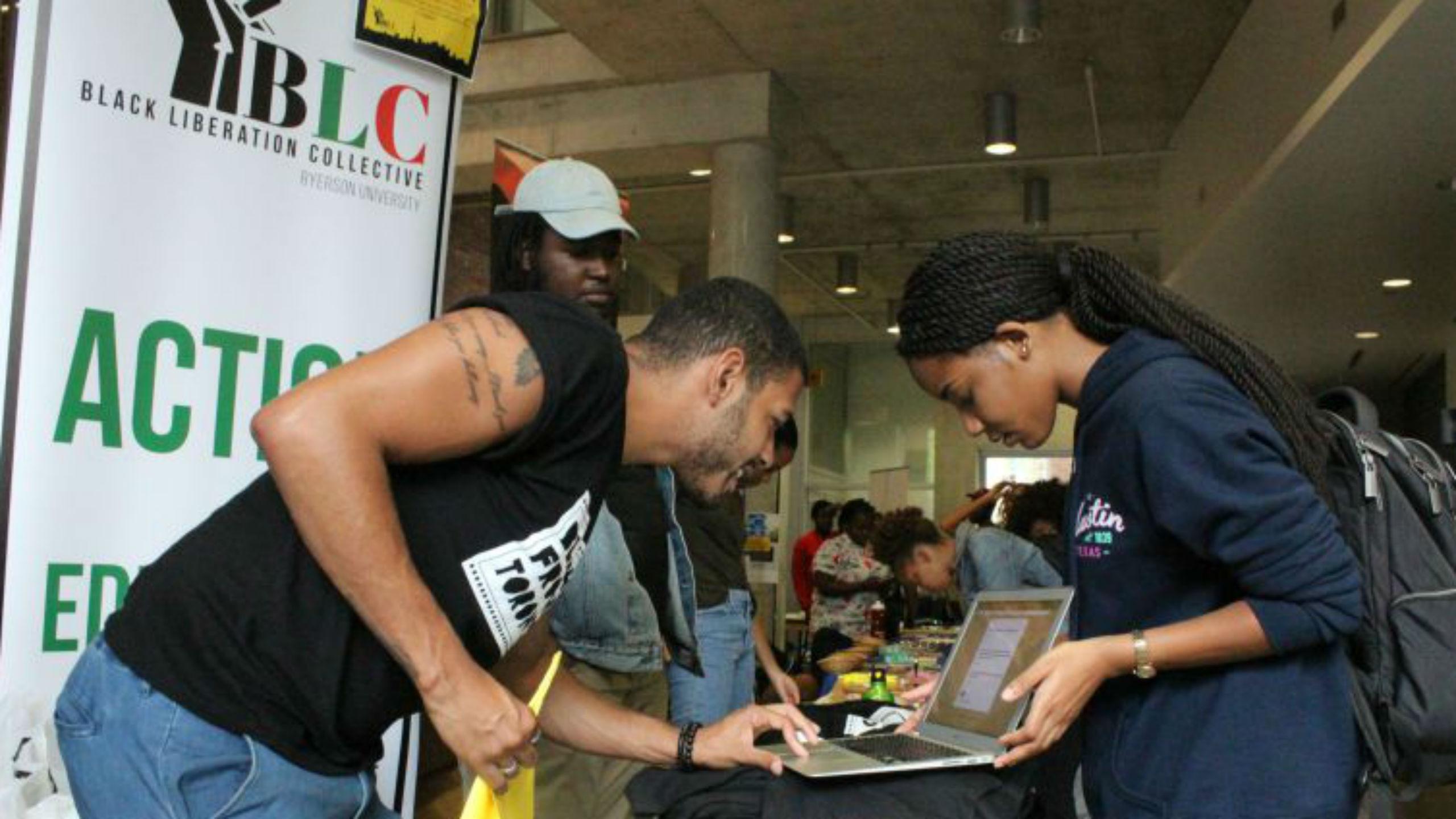By Kiernan Green
Black and Indigenous students met in solidarity for one another at the Glad Day Bookstore on Thursday. Called the Black and Indigenous Solidarity Café, it was another event organized by The Black Liberation Collective (BLC) for Black Frosh.
“I think about the ways colonial movements around the world have affected Black and Indigenous people,” said Indigenous activist Danielle Sinclair.*
Sinclair, an Anishinaabe First Nation and Ryerson alumni, said colonialism, “separated Black people from their Indigenous territories, and forcibly planted them in other Indigenous territories,” while disrupting Black* peoples relationship to their land.
“I think about institutions,” said Sinclair, “Any colonial institution, any state institution, was not made for Black and brown people.”
Ryerson is a product of a colonial state and was, “not made for Black and brown people,” Sinclair said.
Jenna Johnson, a mature Ryerson student and member of the Indigenous Students Association, said she resonated with Sinclair’s words on her community.
“Often times I feel like I can’t really vibe with everybody at Ryerson,” said Johnson. “I just needed to be with Indigenous and Black students and just connect again. This is my community.”
“It’s so important for us to stay together and to network because we’re in the same boat in a lot of ways,” said Sarah Dennis, a mature student and Anishinaabe First Nation in attendance.
“We’re struggling with going to school and trying to make a difference. It’s just really important to keep the connection alive and to be around like-minded people.”
The Indigenous Students Rising (ISR) letter to the university addressed that there’s “no clear outline policy or accountability when it comes to Black students and faculty.” The ISR and the BLC asked for culturally relevant counseling services, more transparency regarding Ryerson’s partnership with Toronto Police Services, and the hiring of more Black and Indigenous staff, among other things.
These requests were three of several, posted on the walls of the café. Attendees were invited to place stickers on the posts, showing their desires to see the requests fulfilled. The requests will soon be released as a list to Ryerson University and to the public, BLC co-founder Josh Lamers told The Eye over Facebook Messenger.
In attendance was also Kikélola Roach, Uniform National Chair in Social Justice and Democracy at Ryerson and former member of the Black Action Defence Committee (BADC). She said that education and reconciliation were the best tools to move past Ryerson’s colonial legacy.
Indigenous knowledge is limited at Ryerson because credential barriers prevent Indigenous educators from joining university faculty, said Roach. Racialized university staff have only increased slightly from 17 per cent to 21 per cent between 2006 and 2016, according to a report from the Canadian Association of University Teachers published in April.
Likewise, the lack of a discussion surrounding Canada’s involvement, and how they benefited from the trans-Atlantic slave trade, perpetuate the false narrative that the nation has always been a “safe haven” for Black people and human rights.
Roach said that hopefully the conversation surrounding such issues, and the relationship between Black and Indigenous communities, will continue past Black Frosh week. She said that Ryerson programs such as the annual Social Justice Week (which she organized this year), were a “wonderful learning opportunity”, but also tokenistic and hollow.
For these programs to have an impact, Ryerson needs permanent staff with a “grand vision” of responsibility to the people and cultures that make up the school.
Roach, whose term at Ryerson will end in 2020, said she has found students “hungry” to learn and engage with the struggles of Black and Indigenous communities.
Sinclair said she doesn’t want non-racialized students to be only sympathetic to racialized issues. “Get pissed off. Get angry as if it was your issue. Put your voice in the way when you’re in a classroom and somebody says something ignorant,” she said.
Indigenous Elder’s Pauline Shirt and Vern Harper joined the BADC in 1992 during a protest against Toronto police trend of police brutality and systemic anti-Black racism. This was also known as the Yonge Street Uprising, where demonstrators led a movement from the U.S. Consulate on University Ave to City Hall. Many young protestors doubled back on Yonge, and many more people joined them along the way in what was described as a riot. Windows were broken and police had eggs, bottles and stones thrown at them.*
Roach mentioned the involvement of the Freedom Riders in the Oka Crisis of 1990, and the Black Lives Matter Toronto contribution to the occupation of the Indigenous and Northern Affairs office in 2016. All were moments of solidarity between both communities.
“Our aunties and uncles, our grandmas and grandpas have set the stage for us to be there for one another,” said Sinclair. “These are the ties that bind Black and Indigenous people—our histories, our wars, our uprisings, our victories.”
Sinclair said she is grateful for the connection between Ryerson’s Black and Indigenous communities.
“Not only are we respectful of self-determination, of each other’s human rights and fights for equity and life itself, but we nurture those things in each other. We show up for each other, we stand up for each other. And that is something we can celebrate.”
An earlier version of this article contained the following errors:
Danielle Sinclair was misquoted to say the foremost struggle for both communities is the legacy of colonialism, rather it is one of the ways these groups are connected.
Sinclair was misquoted saying that colonialism made Black people disrupt the relationship between Indigenous people and their land, rather it restricted the relationships they could have with their own land.
Sinclair was quoted saying that Ryerson is a colonial structure, rather she meant it is a product of a colonial state.
The Indigenous Students Rising group was incorrectly called Indian Students Rising. That is an unacceptable term to use when referring to Indigenous peoples.
The Eyeopener regrets these errors.













Leave a Reply